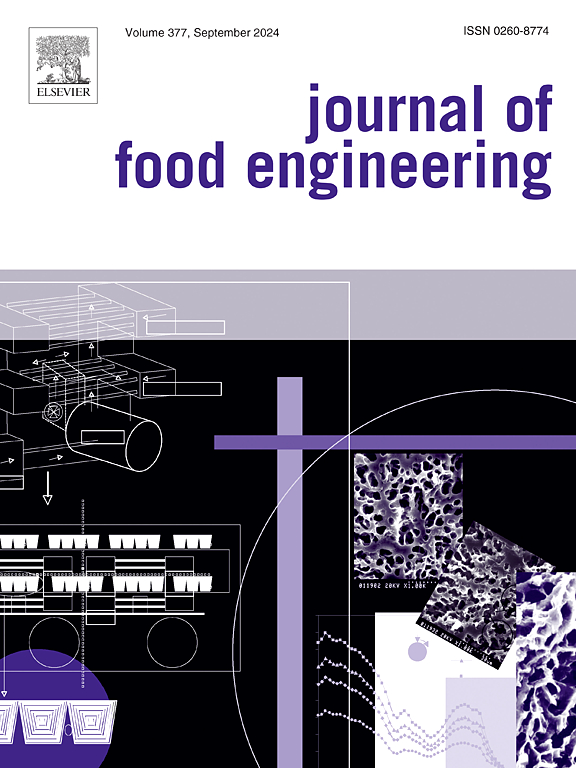多层包埋益生菌结构的耐热性和稳定性
IF 5.8
2区 农林科学
Q1 ENGINEERING, CHEMICAL
引用次数: 0
摘要
来自肠道菌群研究的证据强调了益生菌在促进人类健康和市场需求方面的重要性。然而,益生菌对储存环境中的不利因素(如湿度、温度、氧气和光线)特别敏感,经常导致保质期内的活力降低,失去原有的益处。本研究以多层包埋的结构为研究重点,在考虑高包装效率和成本效益的同时,着重提高植物乳杆菌的耐热性、透湿性和益生菌的储存稳定性。与谷氨酰胺转胺酶(TGase)交联的酪蛋白/果胶凝聚物在80℃下加热5 min, 1 h和5 h的活菌对数分别为5.33和5.25 CFU/g,其耐热性高于对照组(酪蛋白为4.56 CFU/g)。此外,在37℃、51%相对湿度(RH)条件下贮藏15 d的稳定性结果也呈现出相同的趋势。交联1和5 h的组比对照组有更高的活力,这意味着粉末在吸湿性方面表现令人满意。同样,在80°C加热5 min后,不同菜籽油与棕榈硬脂比例(100:0、70:30和50:50)组的活菌数量均高于对照组。此外,TGase交联的酪蛋白/果胶可以在不同的乳化包油比例下增强益生菌粉的稳定性,提高其耐热性。因此,本研究结果可能应用于封装和保存环境敏感的生物活性成分,包括益生菌。本文章由计算机程序翻译,如有差异,请以英文原文为准。
Thermal resistance and stability of multilayers embedding probiotic structure
Evidence from gut microbiota studies highlights the importance of probiotics in promoting human health alongside the market's demand. However, probiotics are particularly sensitive to unfavorable factors in a storage environment (e.g., humidity, temperature, oxygen, and light), frequently resulting in reduced viability during shelf life and a loss of original benefits. This study focused on the structure of multilayer embedding, with particular attention on enhancing the Lactobacillus plantarum thermal resistance, moisture permeability, and stability of probiotics for storage while considering high packaging efficiency and cost-effectiveness. The log values of viable bacteria in casein/pectin condensates cross-linked with transglutaminase (TGase) for 1 and 5 h, while heated at 80 °C for 5 min, were 5.33 and 5.25 CFU/g, respectively, with higher thermal tolerance than the control group (casein, 4.56 CFU/g). In addition, the storage stability results for 15 days at 37 °C with 51 % relative humidity (RH) showed the same trend. The groups cross-linked for 1 and 5 h had higher viability than the control group, implying that the powders performed satisfactorily regarding hygroscopicity. Similarly, after 5 min of heating at 80 °C, the viable bacteria were higher in groups with different ratios of canola oil to palm stearin (100:0, 70:30, and 50:50) than in the control group. Moreover, TGase cross-linked casein/pectin may enhance stability and improve probiotic powders' thermal tolerance, along with different emulsification oil embedding ratios. Hence, the findings of this study may be applied to encapsulating and preserving environmentally sensitive bioactive components, including probiotics.
求助全文
通过发布文献求助,成功后即可免费获取论文全文。
去求助
来源期刊

Journal of Food Engineering
工程技术-工程:化工
CiteScore
11.80
自引率
5.50%
发文量
275
审稿时长
24 days
期刊介绍:
The journal publishes original research and review papers on any subject at the interface between food and engineering, particularly those of relevance to industry, including:
Engineering properties of foods, food physics and physical chemistry; processing, measurement, control, packaging, storage and distribution; engineering aspects of the design and production of novel foods and of food service and catering; design and operation of food processes, plant and equipment; economics of food engineering, including the economics of alternative processes.
Accounts of food engineering achievements are of particular value.
 求助内容:
求助内容: 应助结果提醒方式:
应助结果提醒方式:


